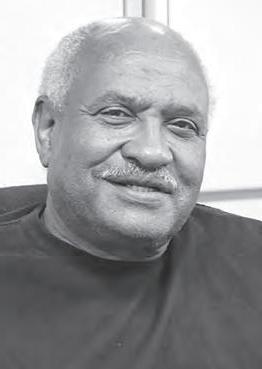
4 minute read
CA Democratic Party Endorses 'Pro-Black' Propositions

The California Democratic Party Black Caucus put on four press conferences across the state to call for support of several ballot initiatives. Pictured here at the podium is Taisha Brown, Chair of the California Democratic Party African American Caucus
By Antonio Ray Harvey
California Black Media
The California Democratic Party African American Caucus (CDPAAC) hosted press conferences at four locations across the state to call on Black Californians to support what that group has deemed as the “pro-Black” propositions on this November’s ballot.
The news conferences were held in metropolitan areas with some of the largest numbers of African American voters in the state -- Los Angeles, Oakland, San Diego and Sacramento -- on Thursday, Oct. 22. The initiatives the CDPAAC has endorsed are: Prop 15 (split roll tax), Prop 16 (repeal of Prop 209); Prop. 17 (restoring voting rights for ex-prisoners); and Prop 21 (rent control).
The CDPAAC’s Black women leaders who led the effort also used the political event to criticize what they describe as attempts by some “bad actors” within the African American community to undermine initiatives that could improve the lives of African Americans.

Kendra Lewis, vice chair of the CDPAAC, called out the California - Hawaii National Association for the Advancement of Colored People (NAACP), saying that group is one of the detractors whose positions on ballot measures go against African American interests.
Although the CDPAAC is supporting four “pro-Black” ballot propositions, it is emphasizing two of them: Prop 15 and Prop 21.
Prop. 15, the “Tax on Commercial and Industrial Properties for Education and Local Government Funding Initiative,” would levy higher real-estate taxes on business and industrial buildings than on residential homes. The initiative’s intent is to increase funding for public schools, community colleges, and local government services by changing the tax assessment of commercial and industrial properties. The state’s fiscal analyst has estimated that, upon full implementation, Prop 15 would generate between $8 billion and $12.5 billion in revenue per year. Forty percent of the revenue would be allocated to schools while the other 60 % would fund local government.
Khiry Moore, an educator, photographer and entrepreneur in Sacramento who owns a couple of rental properties with his wife, says he neither supports Prop 21 nor Prop 15.

Ellen Nash of BAPAC San Diego
Photo: Voice & Viewpoint
“The problem we have as a culture or race is that we don’t allow objective thought. We don’t focus on how these propositions would benefit or affect us as Black people,” he said. “You must remember. We – the Black Caucus -- supported welfare reform and 1990s crime bills.”
At the CDPAAC Sacramento event, L. Lacey Barnes, Executive Vice President of the California Federation of Teachers, said she supports Prop 15.
“For small businesses, I think the (minimum) number is at $3 million. At the most 80 % (of Black businesses won’t meet that threshold),” Barnes said, describing the size of businesses that would be taxed if voters approve Prop 15 next week.
But Huffman and the California State Hawaii NAACP insist Prop. 15 would not benefit Black businesses and lower income Americans. In fact, in a statement about the initiative, Huffman said it would hinder the upward mobility of Black working people.
“The property tax hike on the November ballot will hurt minority communities -- causing more gentrification, killing jobs, and increasing the cost of living for working families,” she wrote.
Along with Huffman, former state Assembly member Roderick Wright, former state Assembly Speaker Willie Brown, and pastor Amos C. Brown, president of the San Francisco branch of the NAACP, oppose Prop 15.
Almost $125 million has been poured into the fights for and against Prop 15. The Schools and Communities First Political Action Committee (PAC) has raised $63.39 million in favor of the initiative. Seven PACs, including Californians to Stop Higher Property Taxes, have collected $60.72 million in an effort to defeat Prop 15.
Prop 21, the “Local Rent Control Initiative,” would allow cities to introduce new rent control laws or expand existing ones. Huffman says she and California -Hawaii NAACP are concerned that, if Prop 21 passes, it would pave the way for higher real estate costs, which would increase unaffordability in the state’s housing market, leading to more evictions. This would severely affect the Black community, she says.
The effort to place Prop 21 on the ballot is to repeal the Costa-Hawkins Rental Housing Act (Costa-Hawkins). Costa-Hawkins is a state statute that limits the use of rent control in California.
Prop 21 is opposed by a diverse group of seniors, veterans, labor, homeowners, affordable housing advocates, and businesses. They say the timing of the initiative is especially bad, too, as many homeowners in the state that rent properties are suffering because of the COVID-19 pandemic.
The Homeowners and Tenants United PAC has raised $40.20 million to support Prop 21 while Five PACs, including Californians for Responsible Housing, has garnered $73.41 million in opposition to the initiative.
Gov. Newsom opposes Prop 21.

Kenda Lewis, vice-chair of the California Democratic Party Black Caucus
“In the past year, California has passed a historic version of statewide rent control – the nation’s strongest rent caps and renter protections in the nation – as well as short-term eviction relief,” said Newsom. “But Proposition 21, like Proposition 10 before it, runs the all-too-real risk of discouraging availability of affordable housing in our state.”








